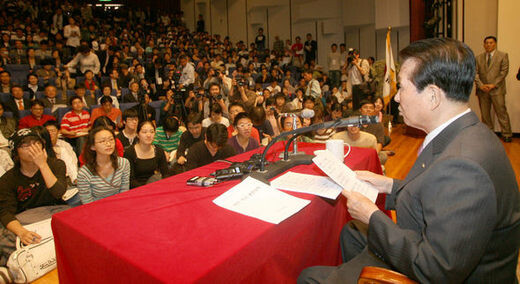hankyoreh
Links to other country sites 다른 나라 사이트 링크
Keep sun shining on North: Kim Dae-jung

In a lecture at Seoul National University on October 19, former president Kim Dae-jung said that West Germany gave East Germany US$3.2 billion, but East Germany’s government eventually collapsed, rather than getting stronger because of the donated funds.
He was addressing those who say that the government is pouring money into North Korea and thus propping up the Kim regime, a call made stronger after the North tested a nuclear device on October 9.
Former president Kim said, "We gave only US$100 million to North Korea. Why do they take issue with the fact that we help dying North Koreans who think and live the same as we do?" He was referring to the amount of money later found to have been transferred to Pyongyang shortly before himself and Kim Jong-il held their historic 2000 Joint Summit there.
Since the North’s nuclear test, Kim has raised his voice, as well. He stressed a solution to North Korea’s nuclear crisis in accordance with his so-called Sunshine Policy, which has been carried through in the current Roh administration’s "engagement policy" with the North.
The lecture, titled "North Korea’s nuclear program and the Sunshine Policy," the Nobel Peace Prize laureate emphasized, "As the North’s nuclear weapon test is a direct violation of the ’Joint Declaration of the Denuclearization of the Korean Peninsula’ signed by the two Koreas in December 1991, we once again firmly demand that North Korea scrap its nuclear weapons according to our legal rights." Kim, however, noted that North Korea and the United States should jointly take responsibility for the current situation, adding, "Even after the nuclear test, Pyongyang has pledged that if its security is guaranteed through North Korea-U.S. direct bilateral talks and [the U.S.] lifts economic sanctions against it, it will positively accept the denuclearization of the peninsula." As an immediate solution, Kim urged the communist regime to completely abandon its nuclear program and the U.S. to guarantee North Korea’s security and to normalize diplomatic relations with Pyongyang.
Kim was scheduled to give a lecture under the title, "Challenges in the 21st century and South Korea’s options," but he changed the theme to reflect the current situation at hand.
When Kim mentioned both the merits and shortcomings of his Sunshine Policy, he said, "If the North’s nuclear test had happened before the historic South-North summit, a panic would have hit the South and there would have been a mass fleeing of the population," giving the policy credit for the relatively restrained response to the test from South Korean society.
When he said, "Students here also can feel relieved because of the Sunshine Policy," attending students applauded.
Lee Cheol-ho, a student, asked about the fact that the engagement policy on North Korea hasn’t brought changes to the North’s political and military sectors. Kim replied, "It didn’t bring about direct changes, but [the North’s] public sentiment has significantly changed from hostility to envy and gratitude."
Regarding economic sanctions against the reclusive nation, Kim pointed out that North Korea is familiar with economic hardship and that economic sanctions may lead to a second nuclear test or provocation along the demilitarized zone (DMZ).
He also sharply criticized the U.S. proposal that South Korea stop Mt. Geumgang (Kumgang) tours. Kim said, "We have secured enormous economic interests in North Korea. [This] means that the truce line has moved that much farther North."
He told to the students that "without unification, there will be no future for our nation." Kim also asked the students to "become geniuses in diplomacy and to carry out diplomacy with powerful countries while maintaining a spirit of independence." The hall was packed with students, and about 200 stood without seats to hear the lecture.
Editorial・opinion
![[Column] Has Korea, too, crossed the Rubicon on China? [Column] Has Korea, too, crossed the Rubicon on China?](https://flexible.img.hani.co.kr/flexible/normal/500/300/imgdb/original/2024/0419/9317135153409185.jpg) [Column] Has Korea, too, crossed the Rubicon on China?
[Column] Has Korea, too, crossed the Rubicon on China?![[Correspondent’s column] In Japan’s alliance with US, echoes of its past alliances with UK [Correspondent’s column] In Japan’s alliance with US, echoes of its past alliances with UK](https://flexible.img.hani.co.kr/flexible/normal/500/300/imgdb/original/2024/0419/2317135166563519.jpg) [Correspondent’s column] In Japan’s alliance with US, echoes of its past alliances with UK
[Correspondent’s column] In Japan’s alliance with US, echoes of its past alliances with UK- [Editorial] Does Yoon think the Korean public is wrong?
- [Editorial] As it bolsters its alliance with US, Japan must be accountable for past
- [Guest essay] Amending the Constitution is Yoon’s key to leaving office in public’s good graces
- [Editorial] 10 years on, lessons of Sewol tragedy must never be forgotten
- [Column] A death blow to Korea’s prosecutor politics
- [Correspondent’s column] The US and the end of Japanese pacifism
- [Guest essay] How Korea turned its trainee doctors into monsters
- [Guest essay] As someone who helped forge Seoul-Moscow ties, their status today troubles me
Most viewed articles
- 1[Column] The clock is ticking for Korea’s first lady
- 2After 2 months of delayed, denied medical care, Koreans worry worst may be yet to come
- 3[Column] Has Korea, too, crossed the Rubicon on China?
- 4[Correspondent’s column] In Japan’s alliance with US, echoes of its past alliances with UK
- 5Samsung barricades office as unionized workers strike for better conditions
- 6All eyes on Xiaomi after it pulls off EV that Apple couldn’t
- 7US overtakes China as Korea’s top export market, prompting trade sanction jitters
- 8Hong Se-hwa, voice for tolerance whose memoir of exile touched a chord, dies at 76
- 9[Photo] Smile ambassador, you’re on camera
- 10[Editorial] When the choice is kids or career, Korea will never overcome birth rate woes